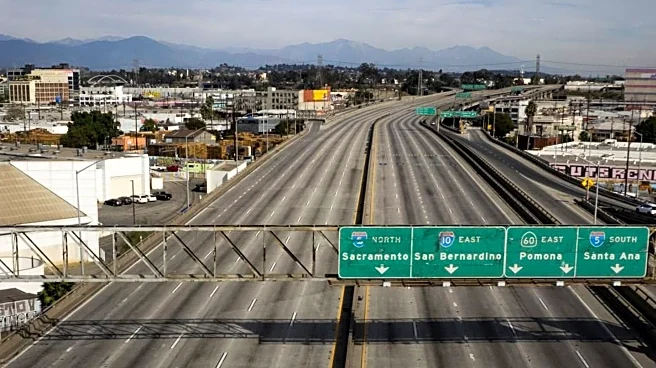What's Happening?
Colma, California, known as the 'City of Souls,' is a unique necropolis where the deceased outnumber the living by a thousand to one. Established in the early 1900s after San Francisco banned new burials,
Colma became the final resting place for many, including notable figures like Joe DiMaggio and Wyatt Earp. The town, incorporated in 1924, houses 1.6 million souls across 17 cemeteries, with only about 1,600 living residents. The cemeteries, which include Italian, Serbian, and Japanese, are maintained by generations of local families who continue to serve the dead through businesses like monument making and taverns. Despite its macabre reputation, Colma is a place of reverence and history, where the living embrace the motto, 'It’s great to be alive in Colma.'
Why It's Important?
Colma's existence highlights the historical and cultural significance of how societies manage and honor their dead. The town serves as a reminder of the urban challenges faced by growing cities like San Francisco, which had to relocate cemeteries to make room for the living. Colma's cemeteries are not only a testament to the past but also a tourist attraction, drawing visitors interested in history and genealogy. The town's unique demographic composition and its role in preserving the stories of those who have passed offer insights into the cultural practices surrounding death and remembrance in the U.S.
What's Next?
Colma continues to balance its identity as a necropolis with the needs of its living residents. The town's cemeteries remain a peaceful refuge amidst the bustling San Francisco Peninsula, attracting both mourners and tourists. As cremation becomes more popular, Colma's cemeteries are adapting to changing burial practices. The town also faces the challenge of maintaining its historical sites while accommodating modern developments, such as car dealerships and casinos, which contribute to its economy. The ongoing preservation of Colma's cemeteries and historical sites will be crucial in maintaining its unique cultural heritage.
Beyond the Headlines
Colma's story raises questions about urban planning and the ethical considerations of relocating cemeteries. The town's history reflects broader societal attitudes towards death and the importance of preserving cultural heritage. Colma's cemeteries serve as a microcosm of American society, housing a diverse array of individuals from different backgrounds and social standings. The town's approach to balancing reverence for the dead with the needs of the living offers a model for other communities facing similar challenges.











